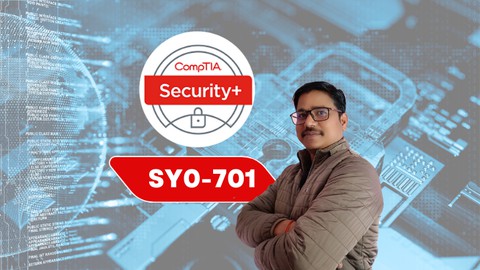
CompTIA Security+ (SY0-701) Certification Training
CompTIA Security+ (SY0-701) Certification Training, available at $44.99, has an average rating of 4.19, with 170 lectures, based on 158 reviews, and has 3234 subscribers.
You will learn about Understanding foundational cybersecurity concepts. Identifying various types of security threats and attacks. Implementing cryptography techniques for data protection. Developing skills in risk management and incident response. Securing network infrastructure and protocols. This course is ideal for individuals who are The CompTIA Security+ course is designed for individuals aspiring to pursue careers in cybersecurity. It's suitable for: Entry-level IT professionals seeking to specialize in security. Students or recent graduates interested in cybersecurity roles. IT professionals looking to validate their security knowledge and skills. Anyone aiming to enhance their understanding of cybersecurity fundamentals. Individuals preparing for security-related certifications or roles. It is particularly useful for The CompTIA Security+ course is designed for individuals aspiring to pursue careers in cybersecurity. It's suitable for: Entry-level IT professionals seeking to specialize in security. Students or recent graduates interested in cybersecurity roles. IT professionals looking to validate their security knowledge and skills. Anyone aiming to enhance their understanding of cybersecurity fundamentals. Individuals preparing for security-related certifications or roles.
Enroll now: CompTIA Security+ (SY0-701) Certification Training
Summary
Title: CompTIA Security+ (SY0-701) Certification Training
Price: $44.99
Average Rating: 4.19
Number of Lectures: 170
Number of Published Lectures: 170
Number of Curriculum Items: 170
Number of Published Curriculum Objects: 170
Original Price: ₹2,699
Quality Status: approved
Status: Live
What You Will Learn
- Understanding foundational cybersecurity concepts.
- Identifying various types of security threats and attacks.
- Implementing cryptography techniques for data protection.
- Developing skills in risk management and incident response.
- Securing network infrastructure and protocols.
Who Should Attend
- The CompTIA Security+ course is designed for individuals aspiring to pursue careers in cybersecurity. It's suitable for: Entry-level IT professionals seeking to specialize in security. Students or recent graduates interested in cybersecurity roles. IT professionals looking to validate their security knowledge and skills. Anyone aiming to enhance their understanding of cybersecurity fundamentals. Individuals preparing for security-related certifications or roles.
Target Audiences
- The CompTIA Security+ course is designed for individuals aspiring to pursue careers in cybersecurity. It's suitable for: Entry-level IT professionals seeking to specialize in security. Students or recent graduates interested in cybersecurity roles. IT professionals looking to validate their security knowledge and skills. Anyone aiming to enhance their understanding of cybersecurity fundamentals. Individuals preparing for security-related certifications or roles.
Course Description:
Are you ready to take your cybersecurity skills to the next level? Welcome to the Comprehensive CompTIA Security+ Certification Training course!
In today’s digital age, cybersecurity is more critical than ever. Whether you’re an IT professional looking to enhance your security knowledge or a beginner interested in starting a career in cybersecurity, this course is designed to equip you with the essential skills and knowledge needed to pass the CompTIA Security+ certification exam.
This comprehensive course covers everything you need to know to become a certified cybersecurity professional. From understanding core security principles to implementing advanced security measures, you’ll learn from industry experts with real-world experience.
What You’ll Learn:
-
Master the fundamentals of cybersecurity, including confidentiality, integrity, and availability (CIA triad).
-
Explore common cyber threats, attack vectors, and vulnerabilities.
-
Gain hands-on experience with network security, cryptography, and secure communication protocols.
-
Learn about identity and access management, authentication methods, and user access controls.
-
Discover security technologies and tools used to detect, prevent, and respond to cyber threats.
-
Understand incident response and recovery procedures, business continuity planning, and disaster recovery strategies.
-
Dive into security policies, compliance requirements, and governance frameworks.
-
Develop ethical hacking skills and learn penetration testing methodologies.
-
Stay updated with the latest cybersecurity best practices and industry trends.
Why Choose This Course?
-
Expert Instruction: Learn from certified cybersecurity professionals with years of industry experience.
-
Practical Training: Gain hands-on experience with real-world scenarios and practical exercises.
-
Exam Preparation: Prepare effectively for the CompTIA Security+ certification exam with comprehensive exam coverage and practice tests.
-
Career Advancement: Enhance your cybersecurity skills and boost your career prospects in the IT industry.
-
Community Support: Join a supportive learning community and network with peers and experts in the field.
Enroll now and start your journey toward becoming a certified CompTIA Security+ professional! Let’s secure the digital world together!
Course Curriculum
Chapter 1: Introduction
Lecture 1: Introduction
Chapter 2: Summarize Fundamental Security Concepts
Lecture 1: Elements of Information Security
Lecture 2: Cyber Security Framework
Lecture 3: Gap Analysis and Access Control
Lecture 4: Security Control Categories
Lecture 5: Security Control Functional Types
Lecture 6: Information's Rolls and Responsibility and Units
Chapter 3: Compare Threat Types
Lecture 1: Introduction : Compare Threat Types
Lecture 2: Vulnerability, Threat, and Risk
Lecture 3: Attributes and Motivations of Threat Actors
Lecture 4: Different types of Threat actors and hacktivist
Lecture 5: Attack Surface and Vulnerable Software Vectors
Lecture 6: Network and Lure based attack
Lecture 7: Supply Chain Attack Surface
Lecture 8: Social Engineering – Impersonation and Pretexting
Lecture 9: Phishing, pharming and Typo squatting
Lecture 10: Compromise business Emails
Chapter 4: Explain Cryptographic Solutions
Lecture 1: Introduction of Cryptographic Solutions
Lecture 2: Cryptographic Concepts
Lecture 3: Symmetric Encryption
Lecture 4: Key Length
Lecture 5: Asymmetric Encryption
Lecture 6: Hashing
Lecture 7: Digital Signature
Lecture 8: Certificate Authorities
Lecture 9: Digital Certificate and Root of Trust
Lecture 10: Certificate Signing Requests and CN
Lecture 11: Certificate Revocation and Key Management
Lecture 12: Crypto processors and Secure Enclaves
Lecture 13: Key Escrow
Lecture 14: Encryption Supporting Confidentiality file, disk and database encryption
Lecture 15: Transport Encryption and Key exchange
Lecture 16: Perfect Forward Secrecy
Lecture 17: Salting, key stretching and Block Chain
Chapter 5: Implement Identity and Access Management
Lecture 1: Authentication Design
Lecture 2: Password concepts and password manager
Lecture 3: Multifactor and Biometric Authentication
Lecture 4: Type of Authentication Hard, soft and password less
Lecture 5: DAC and MAC
Lecture 6: Role-based and Attribute-Based Access Control
Lecture 7: Rule-Based Access Control
Lecture 8: Least privilege an user account provisioning
Lecture 9: Account Attributes and Access and restriction policies
Lecture 10: Local, Network, and Remote Authentication
Lecture 11: Directory Service and Single Sign-on Authentication
Lecture 12: Federation or Shared sign-on authentication
Lecture 13: SAML and OAuth
Chapter 6: Secure Enterprise Network Architecture
Lecture 1: Introduction : Maintain Enterprise Campus Network Architecture
Lecture 2: Architecture and Infrastructure concept
Lecture 3: Network Infrastructure
Lecture 4: Switching and Routing Infrastructure Considerations
Lecture 5: Security Zones and Attack Surface
Lecture 6: Port Security and Physical Isolation
Lecture 7: Architecture Considerations
Lecture 8: Device Placements and Attributes
Lecture 9: Layer 4 and Layer 7 Firewall
Lecture 10: Proxy Server and IDS
Lecture 11: NGF, UTM and Load Balancer
Lecture 12: VPN Remote Access Architecture
Lecture 13: IPSec and TLS Tunneling
Lecture 14: Internet Key Exchange in VPN
Lecture 15: RDP and Secure Shell
Lecture 16: Out of band Management and Jump Servers
Chapter 7: Secure Cloud Network Architecture
Lecture 1: Cloud deployment Models based on Ownership
Lecture 2: Security Considerations on Cloud Infra
Lecture 3: 6a-3 Types of Coluds based on services
Lecture 4: Responsibility Matrix Cloud Service Provider and Costumer
Lecture 5: Centralized and decentralized de-computing
Lecture 6: Resilient Architecture Concepts
Lecture 7: Virtualization and Cloud Technology
Lecture 8: Software Defined Networking
Lecture 9: Cloud Features and Security Consideration
Lecture 10: Embedded System and Industrial Control Systems
Lecture 11: Introduction of IOT Devices and its security
Lecture 12: Deperimeterization and Zero Trust
Lecture 13: Essential Components of a Zero Trust Architecture and Security
Chapter 8: Explain Resiliency and Site Security Concepts
Lecture 1: Introduction
Lecture 2: Asset Tracking and monitoring
Lecture 3: Asset Protection Concept
Lecture 4: Data Backups
Lecture 5: Advanced Data Protection
Lecture 6: Secure Data Destruction
Lecture 7: Continuity of Operations
Lecture 8: Capacity Planning Risks
Lecture 9: High Availability
Lecture 10: Testing Redundancy and High Availability and Clustering
Lecture 11: Diversity and Defense in Depth
Lecture 12: Deception technology and Testing Resiliency
Lecture 13: Physical Security
Chapter 9: Explain Vulnerability Management
Lecture 1: Introduction
Lecture 2: Operating System Vulnerabilities
Instructors
-

Vijay Kumar
Instructure for CCNA, Linux, Security+, Pentest+, CySA+,
Rating Distribution
- 1 stars: 2 votes
- 2 stars: 5 votes
- 3 stars: 29 votes
- 4 stars: 57 votes
- 5 stars: 65 votes
Frequently Asked Questions
How long do I have access to the course materials?
You can view and review the lecture materials indefinitely, like an on-demand channel.
Can I take my courses with me wherever I go?
Definitely! If you have an internet connection, courses on Udemy are available on any device at any time. If you don’t have an internet connection, some instructors also let their students download course lectures. That’s up to the instructor though, so make sure you get on their good side!
You may also like
- Digital Marketing Foundation Course
- Google Shopping Ads Digital Marketing Course
- Multi Cloud Infrastructure for beginners
- Master Lead Generation: Grow Subscribers & Sales with Popups
- Complete Copywriting System : write to sell with ease
- Product Positioning Masterclass: Unlock Market Traction
- How to Promote Your Webinar and Get More Attendees?
- Digital Marketing Courses
- Create music with Artificial Intelligence in this new market
- Create CONVERTING UGC Content So Brands Will Pay You More
- Podcast: The top 8 ways to monetize by Podcasting
- TikTok Marketing Mastery: Learn to Grow & Go Viral
- Free Digital Marketing Basics Course in Hindi
- MailChimp Free Mailing Lists: MailChimp Email Marketing
- Automate Digital Marketing & Social Media with Generative AI
- Google Ads MasterClass – All Advanced Features
- Online Course Creator: Create & Sell Online Courses Today!
- Introduction to SEO – Basic Principles of SEO
- Affiliate Marketing For Beginners: Go From Novice To Pro
- Effective Website Planning Made Simple




















